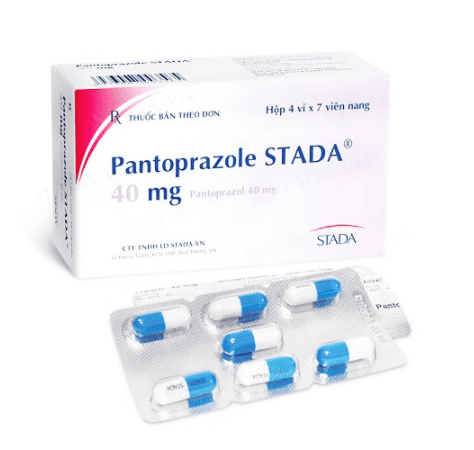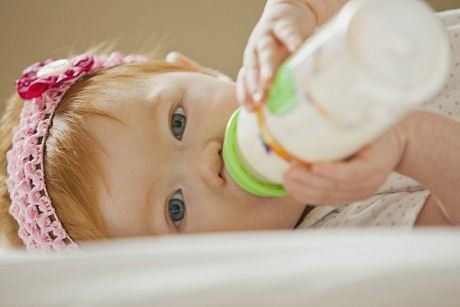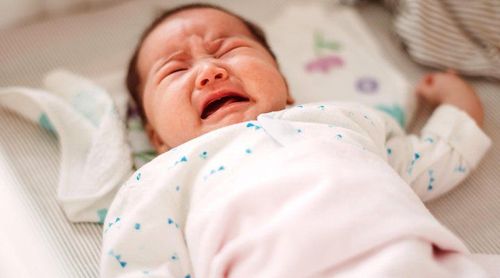This is an automatically translated article.
The article was professionally consulted by Resident Doctor Ho Thi Hong Tho - Neonatologist - Pediatrics - Neonatology Department, Vinmec Phu Quoc International General HospitalChildren eat or vomit stem from many different causes. To be able to handle this situation and ensure your baby's safety, you need to be equipped with scientific and timely handling knowledge. But to what age will the child's ingestion or vomiting last?
1. Why do children eat or vomit?
Vomiting is a common symptom in young children, may be benign, resolve on its own as the child gets older. Vomiting is a phenomenon in which food in the stomach is pushed up into the esophagus, and then out of the mouth due to the contraction of gastric smooth muscle accompanied by contraction of the abdominal wall smooth muscles.Inflammation is a condition in which food flows back into the stomach simply after eating (food has not reached the stomach), usually caused by the lack of rhythmic contraction of the striated esophagus by the oesophagus.
Vomiting can be a manifestation of gastrointestinal diseases such as gastroesophageal reflux disease, it can also be a symptom of a respiratory disease or a systemic disease,... Therefore you need to pay attention. Notice if the child has any other accompanying symptoms, for example: fever or loose stools, cough, runny nose, rash...
Vomiting due to pathology: Vomiting symptoms are common in infectious diseases. bacterial diarrhea, nasopharyngitis, pneumonia, meningitis ... or in some surgical diseases such as intestinal obstruction, intussusception, necrotizing enterocolitis... In these cases, children often vomit suddenly and accompanied by symptoms specific to each disease. Then you need to take the child to a medical facility for timely treatment.
Vomiting simply, not due to disease, often related to eating problems:
By forcing the child to eat too much Due to the baby feeding too full Due to the baby lying down immediately after feeding Due to food intolerance or when the child starting weaning with a new food, or eating too much of a certain food. In this case, vomiting usually appears early, with a small amount of vomit, mainly food. Children still play normally after vomiting, without affecting the body condition. So you just need to adjust the way the baby is fed in this case.
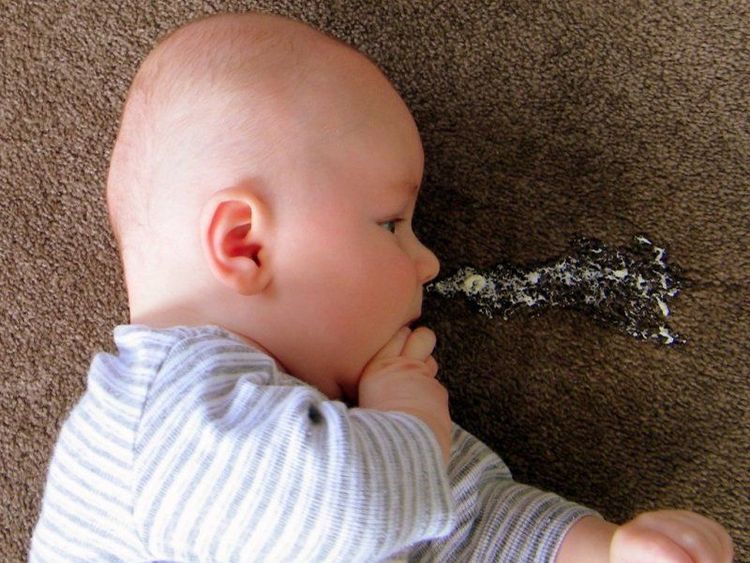
Trẻ bị nôn sau ăn có thể bắt nguồn từ nhiều nguyên nhân khác nhau
2. Children vomiting after eating what to do?
When your baby spits up after eating, the first thing you need to do right away is use a clean towel to wipe your child's mouth. Then to prevent the child from vomiting again, you should put a scarf around your baby's neck. To avoid regurgitation of vomit into the lungs, when your baby is vomiting, you absolutely must not pick him up.When a child vomits, there is often a feeling of fear, so you need to keep a gentle attitude, do not scold, causing the child to cry, lose his temper and spit more. At that time, you should stroke the baby's chest and back in the top to bottom direction and talk to the baby so that he forgets about vomiting.
If the child is lying down, it is necessary to keep the child in the correct position, with the head and upper body elevated to avoid reflux. If the child spits up a lot of milk, place the child on his or her side to prevent vomit from being inhaled into the lungs.
When the child eats and vomits right away, you should not give the child milk right after that, but need to quickly clean the nose and mouth and change the child's clothes.
In case the child chokes due to vomiting, you should not use your hands to pick up food or vomit, but should do the Heimlich maneuver for older children, by standing behind the child, put your hands in front of the child's abdomen and forcefully press on, strong pressure will cause the child to vomit the foreign body in the airway. For young children, you should put the child on his stomach on his lap and pat him on the back, then the foreign body and vomit will be expelled. If your baby is still tired after that, you should take him to the nearest medical facility.
When your baby vomits a lot, like with diarrhea, he loses a fair amount of water. Therefore, it is important that you replenish the lost water so that the child's body does not lose electrolytes. At home, you can use Oresol solution, boiled water or diluted juice.
When the child vomits a lot, don't try to let the baby continue to drink but note:
The position when the child vomits should let the child lie on his side or help the child sit up, in case the child vomits, the vomit will overflow trachea, into the lungs causing respiratory arrest. Wait for the child to vomit less, give a small amount of boiled water or Oresol solution to drink. Children are dehydrated a lot, so they will be thirsty, when given water, children will tend to drink a lot, then they will vomit, so you should give them to drink with a small spoon or sip by sip. If your baby continues to vomit a lot, you should take him to the doctor. If the child vomits less, you need to alternately give him 50ml of Oresol solution and 50ml of boiled water every half hour. After giving the baby such a drink, but the baby does not vomit anymore, you can give your baby breast milk or bottle, gradually increase the amount of milk from 80 to 100ml every 3-4 hours.
If the child does not vomit within 12-24 hours, the baby can eat and drink as usual, but still give him plenty of water. Start feeding your baby with easily digestible foods like cereal or yogurt.
Remember when a child vomits a lot, it means that his digestive system is having problems and needs to rest, so you only give him water to drink to not lose water, do not try to force him to eat, force him to eat does not help. baby, but also makes vomiting worse and baby crying more.
Helping the baby to sleep will make the baby recover faster, because an empty stomach during sleep will help the baby to be more comfortable. Never give your child any anti-emetics without the doctor's approval.
If the child has prolonged vomiting or vomiting due to a medical condition and has other symptoms such as: Fever, abdominal pain, convulsions, lethargy, or continuous vomiting, signs of dehydration such as dry mouth, little water eyes, little urine, ... then you need to take the child immediately to a medical facility for timely treatment.
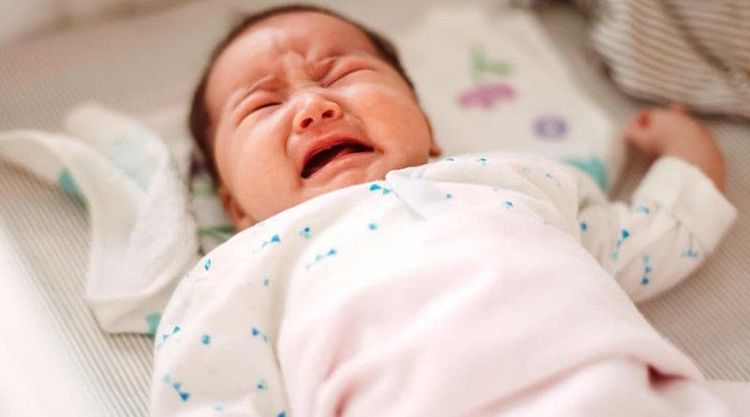
Cần đưa bé đi kiểm tra kịp thời nếu thấy trẻ ăn vào hay nôn và tình trạng nôn trớ kéo dài
3. How to improve the child's feeding or vomiting?
In order to limit the child's ingestion or vomiting, you should be equipped with some specific basic knowledge as follows:
3.1 For breastfed babies Feed slowly and avoid overfeeding. After the baby is finished feeding, hold the baby for at least 15 minutes before letting the baby lie down. The position when breastfeeding is also very important to limit vomiting: You need to hold the baby so that the face is turned to the breast, the baby's nose is facing the nipple, and the body and the baby's head should be in a straight line. . Then, use one hand to support the bottom and the baby close to you until the baby's upper lip touches the breast. When you see the baby gradually open his mouth, adjust so that the baby's lower lip is below the nipple.
Do not let the baby lie on the right side when full, so you should feed the baby on the left first and then switch to the right. This will help the milk in the baby's stomach more easily circulate and limit gastric reflux.
3.2 For bottle-fed babies One of the reasons why babies vomit after eating is because there is a large amount of air entering the stomach during feeding, especially for bottle-fed babies. Therefore, throughout the process of bottle-feeding, you should keep the milk in the mouth of the bottle.
3.3 For children who are eating solid foods You should not force them to eat too much, leading to fear when they see food. It is necessary to divide the child's daily diet into many small meals, but still ensure to provide the necessary quantity and quality of nutrients.
Should practice for children the habit of focusing when eating, the maximum eating time of each meal should only be about 30 minutes back. Because eating for a long time can lead to anorexia in children.
Intolerance to raw milk can be seen in some young children. For these cases, you can give your baby cow's milk in the form of yogurt or soy milk instead.
In addition, you can also add a probiotic product containing beneficial bacteria spores to your child to help improve the functioning of the digestive system, thereby helping to limit the child's vomiting. .
Although vomiting is a common phenomenon in young children, if you do not know how to handle it properly, it is very dangerous for the child, especially when the vomit spills into the trachea, blocking the airway. Therefore, you need to stay calm and handle it properly.
In addition, in order to prevent diseases that babies often get, parents should pay attention to nutrition to improve children's resistance. At the same time, add supporting foods containing lysine, essential micro-minerals and vitamins such as zinc, chromium, selenium, B vitamins,... snacks and less digestive problems.
Parents can learn more:
Why do you need to supplement Lysine for your baby?
The role of zinc - Guidelines for reasonable zinc supplementation
Please visit the website Vinmec.com regularly and update useful information to take care of your baby and family.






